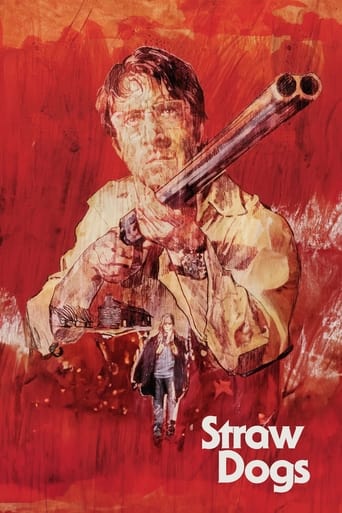chaswe-28402
This disc had been sitting on my shelf for over ten years after its first or second viewing, and I'd been reluctant to re-visit it for some reason, until last night. Now I realise why, because although I hadn't really forgotten it, its deep-reaching and thorough unpleasantness must have seriously turned me off, and warned me away.Somebody likened it to "Irreversible", and I see what they're saying. Peckinpah, although just as over the top, is more realistic and everyday, however. Whatever his themes, you have to admit he regularly gets superbly convincing performances from his actors. In spite of the way he seems to treat them, he also gets very considerable loyalty from many of them. In this case Susan George.He apparently said that it was not about a wimp, but a failed marriage. It's also been said that most of his films are about some kind of treachery or disappointment between buddies. In this case it's the conflict between Hoffman and his totally incompatible wife, with whom he obviously has nothing constructive in common, except sex, which dooms it from the start. This union was clearly a profound mistake, and its disintegration is almost comic. Chess is not going to unite this couple.The only positive outcome of the events depicted is that the odious yokel played by Peter Vaughan never discovered what happened to his pesky little daughter Janice. Impressive work, but not recommended viewing, unless you enjoy torture. The remake is obviously a disaster.
Prismark10
Looking back at Straw Dogs a film that was never shown on UK television for several decades, you get to see how influential it is. Without this movie there would had never been Home Alone!Director Sam Peckinpah might had been contemplating the brutality of the Vietnam war, the rising tide of violence generally in the 1960s counter-culture or just the inherent brutality of man especially when an outsider appears with a local girl.Dustin Hoffman is a mild mannered American university maths professor who have moved into a farmhouse in rural Cornwall where his wife grew up. His wife (Susan George) is flirty, younger and provocatively dressed at times which arouses desires from her ex boyfriend (Del Henney.)The locals are hired to repair the farm house but soon tease the couple, Del Henney takes advantage of George by forcing himself on her and soon she is also raped by one of his friends.When a simpleton local (David Warner) is accused of abducting a girl from the village and ends being protected by Hoffman in his house, the band of locals descend on them and terrorise them. Hoffman realises he needs to fight back in order to protect his wife and Warner.A lot has been said about this movie, the inbred locals, the brutal rape where the victim might have enjoyed part of it, the level of violence.It now looks rather dated, it is a slow burn film, you know where it is going and there is the explosion of violence in the last act with Peckinpah even adding some black humour as two of the thugs chasing each other in kids bicycles. The plot is actually thin and the film felt plodding to me. Hoffman's character seemed to want to integrate with the thuggish locals, maybe to prove he can mix it with the Alpha males, although you have to question how did he end up marrying someone flighty like George who even when the house is under attack wants to runaway from Hoffman who rightly suspects that she will be killed.The film has a curiosity value but I felt that it would not had been highly regarded but for its reputation and banned from a video release for so long by the British censor.
J M
I saw this movie when I was in my teens and decided to watch it again after I heard there has been a remake (which I have chosen not to see--I have always been suspicious of remakes. Ha ha).This movie is basically a social comment on the lower-middle class of Britain (or shall I say of England, since the movie is set in Cornwall, England), how vulgar, primitive, and uncouth the values and mores of average lower middle class there had been in the late 1960' and early 70's, under the veneer of apparent civility. The townspeople including the reverend, taunt the protagonist (played by Hoffman)who is an American, with remarks on the racial tension or the nuclear bombs of the U.S. (insinuating 'moral hazard' and the threat the U.S. posed to the humankind, with the implication that they the British people were morally superior relative to the Americans.) Well, actually the Britishers turn out to be not so morally superior as the plot develops--they murder, rape, steal, cheat and harass people from outside. (The movie had been banned in Britain until 2002. I suspect the supposedly 'controversial' rape scene was not the real agenda for the ban.)Britain has been and is basically a class society, probably even more so than the pre-1917 revolution Russsia. The lower class live vulgar and the 'upper class' live pretending to be not so vulgar--however they are all the same--as Sam Peckinpah portrays the 'reverend.' The English are dangerous people to trust--They are treacherous, under veneer of civility. If you are stranded in a lifeboat with them. They will kill and eat you. Do not trust them just because they sing opera aria.
jinsilver
A collection of caricatures go through the motions of a terrible script, phoning in even the most dramatic moments, spoiling an exciting premise. I'm not even referring to the Cornwall yokels here, who are at least amusing; it's the two main characters who end up being the greatest let-downs, along with the simplistic morality play of a story itself. To its credit, the film is gorgeous, full of beautiful countryside and rustic town, but that can hardly carry two hours of melodrama.Dustin Hoffman plays a perfect effete professor stereotype, a self-centered coward smugly certain of his superiority, and due to that, the near-instant switch into unbeatable gladiator makes little sense. An explosion of rage and dishing out a few good hits before going down, perhaps. This is no Falling Down, where someone on the verge of cracking for a long time finally does; this is someone who becomes savage against his nature, and somehow conjures the skill to kill every enemy. A male superhero fantasy.Susan George is competent as a petulant brat, always needing attention, pushy yet unwilling to take personal action; the nature of their relationship or why they left is never explained, but it's hinted to be teacher/student. Unfortunately, her character never really goes anywhere, and her acting never gives any nuance to even the charged, violent scene preceding the rape. The only time she seems convincing is in the bedroom scene following David's return.The bizarre direction of the rape, that quiet tenderness suggesting that the first wasn't really rape after all, that deep down an attention-seeking girl is really looking for masculine violence from her paramour that she isn't getting from her husband, really confuses me... almost a rape fantasy. And then the whole purpose of the rape is just to create some extra justification for killing the louts, along with audience titillation. In 1971, it may have been shocking to put an on-screen rape in a mainstream movie, kicking off Last House on the Left and a whole series of rape-revenge movies, but now it just looks exploitative and badly done.Rounding out the cast, there's a few louts, an affable retired army major, a teen temptress, her drunken old father, and a retarded pedophile. Their names are hardly important, because all they do is fill a role.Beyond that, no action in the film looks real. The hits don't look real. The deaths don't look real. The rape doesn't look real.Overall, there's nothing in here but a generic western, uprooted and moved to Scotland, and any nuance the story could have had is missing.










